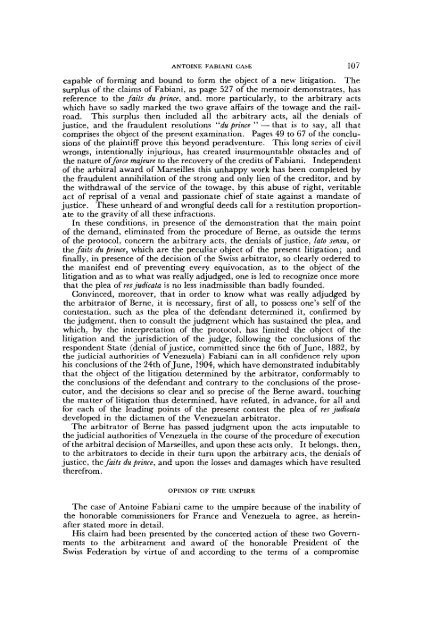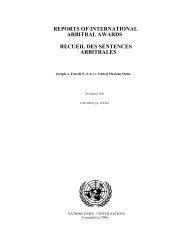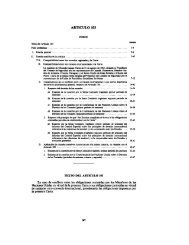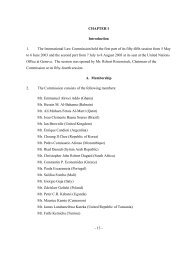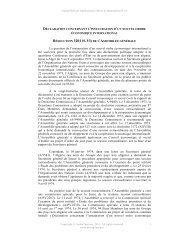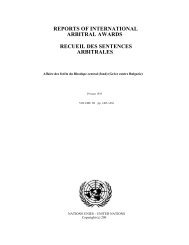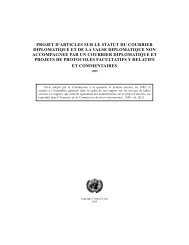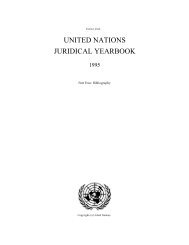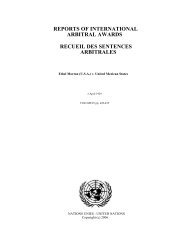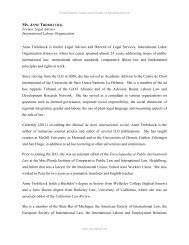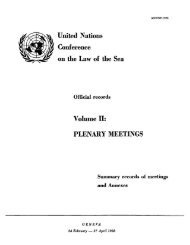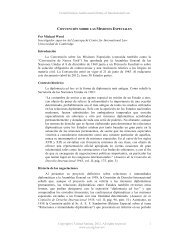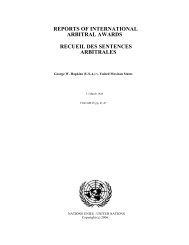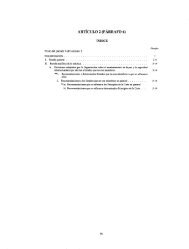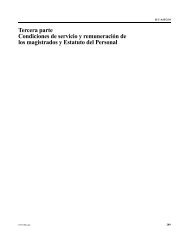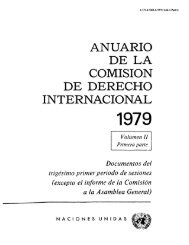Antoine Fabiani Case - United Nations Treaty Collection
Antoine Fabiani Case - United Nations Treaty Collection
Antoine Fabiani Case - United Nations Treaty Collection
You also want an ePaper? Increase the reach of your titles
YUMPU automatically turns print PDFs into web optimized ePapers that Google loves.
ANTOINE FABIANI CASE 107<br />
capable of forming and bound to form the object of a new litigation. The<br />
surplus of the claims of <strong>Fabiani</strong>, as page 527 of the memoir demonstrates, has<br />
reference to the fails du prince, and, more particularly, to the arbitrary acts<br />
which have so sadly marked the two grave affairs of the towage and the railroad.<br />
This surplus then included all the arbitrary acts, all the denials of<br />
justice, and the fraudulent resolutions "du prince " — that is to say, all that<br />
comprises the object of the present examination. Pages 49 to 67 of the conclusions<br />
of the plaintiff prove this beyond peradventure. This long series of civil<br />
wrongs, intentionally injurious, has created insurmountable obstacles and of<br />
the nature of force majeure to the recovery of the credits of <strong>Fabiani</strong>. Independent<br />
of the arbitral award of Marseilles this unhappy work has been completed by<br />
the fraudulent annihilation of the strong and only lien of the creditor, and by<br />
the withdrawal of the service of the towage, by this abuse of right, veritable<br />
act of reprisal of a venal and passionate chief of state against a mandate of<br />
justice. These unheard of and wrongful deeds call for a restitution proportionate<br />
to the gravity of all these infractions.<br />
In these conditions, in presence of the demonstration that the main point<br />
of the demand, eliminated from the procedure of Berne, as outside the terms<br />
of the protocol, concern the arbitrary acts, the denials of justice, lato sensu, or<br />
the faits du prince, which are the peculiar object of the present litigation; and<br />
finally, in presence of the decision of the Swiss arbitrator, so clearly ordered to<br />
the manifest end of preventing every equivocation, as to the object of the<br />
litigation and as to what was really adjudged, one is led to recognize once more<br />
that the plea of res judicata is no less inadmissible than badly founded.<br />
Convinced, moreover, that in order to know what was really adjudged by<br />
the arbitrator of Berne, it is necessary, first of all, to possess one's self of the<br />
contestation, such as the plea of the defendant determined it, confirmed by<br />
the judgment, then to consult the judgment which has sustained the plea, and<br />
which, by the interpretation of the protocol, has limited the object of the<br />
litigation and the jurisdiction of the judge, following the conclusions of the<br />
respondent State (denial of justice, committed since the 6th of June, 1882, by<br />
the judicial authorities of Venezuela) <strong>Fabiani</strong> can in. all confidence rely upon<br />
his conclusions of the 24th of June, 1904, which have demonstrated indubitably<br />
that the object of the litigation determined by the arbitrator, conformably to<br />
the conclusions of the defendant and contrary to the conclusions of the prosecutor,<br />
and the decisions so clear and so precise of the Berne award, touching<br />
the matter of litigation thus determined, have refuted, in advance, for all and<br />
for each of the leading points of the present contest the plea of res judicata<br />
developed in the dictamen of the Venezuelan arbitrator.<br />
The arbitrator of Berne has passed judgment upon the acts imputable to<br />
the judicial authorities of Venezuela in the course of the procedure of execution<br />
of the arbitral decision of Marseilles, and upon these acts only. It belongs, then,<br />
to the arbitrators to decide in their turn upon the arbitrary acts, the denials of<br />
justice, the faits du prince, and upon the losses and damages which have resulted<br />
therefrom.<br />
OPINION OF THE UMPIRE<br />
The case of <strong>Antoine</strong> <strong>Fabiani</strong> came to the umpire because of the inability of<br />
the honorable commissioners for France and Venezuela to agree, as hereinafter<br />
stated more in detail.<br />
His claim had been presented by the concerted action of these two Governments<br />
to the arbitrament and award of the honorable President of the<br />
Swiss Federation by virtue of and according to the terms of a compromise


